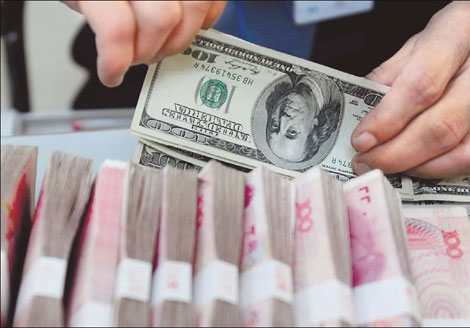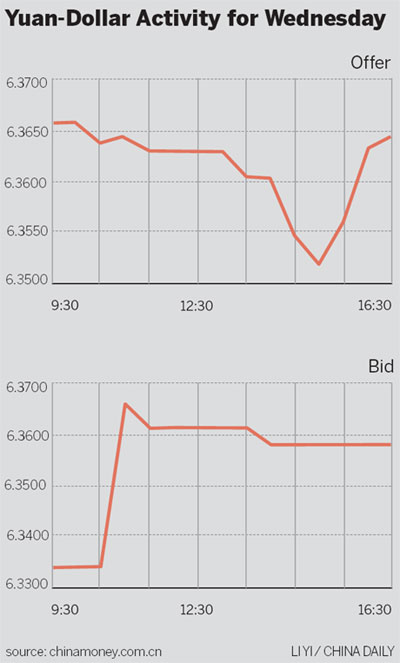No need for worry in weaker yuan: experts
Updated: 2011-12-08 09:39
By Li Xiang, Diao Ying and Hu Yuanyuan (China Daily)
|
|||||||||
Economists see cause of renminbi's decline in Europe's debt woes, investor flight to US dollar
BEIJING - The recent weakening of the yuan shows the growing concerns that China's economy will slow down as other countries' demand for exports declines, analysts said on Wednesday.

Those conditions, they said, have prompted investors to seek a safe haven in the US dollar.
Even so, the Chinese currency will remain strong so long as China can maintain strong and balanced growth, the analysts said.
On Wednesday, the yuan touched the low end of its permitted daily trading range, when 6.3659 yuan were being traded for a US dollar, for the sixth trading day in a row, sparking speculation that it was depreciating. The currency is allowed to fluctuate as much as 0.5 percent above or below a middle-trading price set by the People's Bank of China (PBOC).
"The pressure for the yuan to depreciate is accumulating," said Mei Xinyu, a senior researcher at the Ministry of Commerce's Chinese Academy of International Trade and Economic Cooperation.
"The ongoing financial woes in Europe, the weak recovery in the US and the rising uncertainties in emerging markets have prompted investors to seek a safe haven in the US dollar," Mei said.
The value of the yuan has appreciated compared with the US dollar since 2005, when the PBOC loosened the currency's peg to the greenback. Since November, though, it has not risen as quickly as some expected.
Analysts cited a couple of causes of the currency's weakness: an outflow of speculative capital away from emerging markets and an increasing demand for the US dollar amid Europe's sovereign-debt troubles.
In October, the Chinese central bank's yuan positions for foreign exchange purchases fell by 89.3 billion yuan ($14.2 billion) for the first time in eight years. Analysts saw the decline as indicating an outflow of "hot money".
Despite the yuan's weakening, the central bank has set the middle-trading price of the yuan at a persistently high level. On Wednesday, the yuan managed to make up for its earlier loss; 6.3642 yuan could be traded for each US dollar. That performance, analysts said, resulted from the central bank's attempts to prevent the currency from falling too sharply.
In the past, the rate for exchanging US dollars into onshore yuan had usually been lower than the rate for exchanging them into offshore yuan, indicating an expectation that the yuan would appreciate. That trend, though, has been reversed since September, prompting speculators to try to make quick profits by buying cheaper US dollars in the mainland and selling them overseas.
Zhuang Jian, senior economist at the Asian Development Bank, said that the recent fluctuations in the foreign exchange market have signaled that the yuan's fluctuation will become more pronounced and the currency's appreciation will be slower than expected next year.
"It may signal the end of the one-way rise of the yuan," Zhuang said at an economic forum in Beijing on Wednesday.
Some analysts argue the yuan is weakening because its appreciation is losing momentum and exporters and importers are therefore becoming less interested in holding it.
"Trading companies' behavior is being driven by yuan appreciation expectations," Stephen Green, Robert Minikin and Wei Li, economists at Standard Chartered, said in a report.
A slowdown in world economic growth and a weakening of inflationary pressures have eroded the likelihood that the yuan will appreciate significantly in the next few quarters, they said.
Ding Zhijie, dean of the Beijing-based University of International Business and Economics' school of banking and finance, said the short-term instability in the yuan's exchange rate may force the central bank to use open-market operations to prevent further declines in the currency's value.
"The yuan's weakening will also help pave the way for the market to take a bigger role in determining the value of the currency and providing for a greater flexibility in the system governing the yuan's exchange rate," Ding added.
Chong Quan, deputy trade representative at the Ministry of Commerce, said the yuan's weakness shows the currency is not being manipulated by the government and that its exchange rate instead rises and falls in response to market conditions.
Some economists warned that the decline in value may both hinder China's work to make the yuan into an international currency and bring about political tensions between China and the US.
The Xinhua News Agency quoted Zhang Monan, a researcher with the State Information Center, as saying that the yuan's weakening presents few causes for concern. A moderate fluctuation in the currency's value, he explained, shows that the market believes the Chinese economy is becoming more balanced.
Analysts said that a weaker yuan will help burst bubbles in domestic asset prices and alleviate the pressure the central bank is under to deal with the country's $3.2 trillion worth of foreign exchange reserves.












